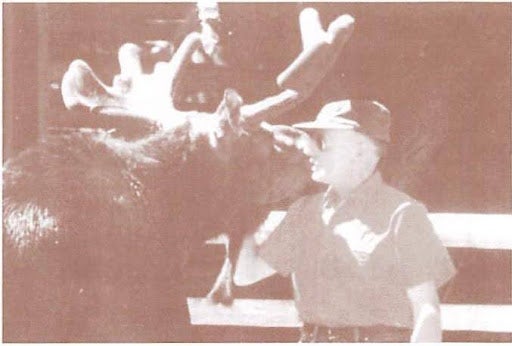The Wyoming Game and Fish Department's Sybille Wildlife Research Unit wouldn't be what it is today, or where it is today, if it were not for Floyd Blunt. He was responsible for establishing the Research Center at its present location, and his forward-thinking resulted in one of the nation's finest research facilities.
Floyd was born to Newton and Mabel Blunt January 24, 19l6 on a homestead near Yoder. He graduated from Guernsey High School in 1937. Putting himself through college by working full-time as a mechanic and gas station attendant in Laramie, he graduated from the University of Wyoming in 1941 with a B.S. in Agriculture. After Pearl Harbor, he joined the Army where he served 4 1/2 years in the South Pacific. Floyd was discharged in 1945 as a decorated Master Sergeant.
His career with the Wyoming Game and Fish Department began in 1946. He took leave to attend graduate school in 1947 but was called back that fall. Floyd's work on large game resulted in an increase in antelope quotas due to improved aerial survey techniques in 1949-50 that showed there were more antelope available
for harvest than previously thought. He worked on an improved deer, elk, and antelope trap design, and these species were subsequently transplanted to new areas. He was instrumental in transplanting the Merriam's Turkey to the Bear Lodge area of the Black Hills.
Floyd became Coordinator of Federal Aid in Wildlife Restoration in 1950. He was released from his duties in 1955 so that he could oversee construction of the Sybille Wildlife Research Unit (now designated the Tom Thorne/Beth Williams Wildlife Research Center).
Sybille was the first of its kind, and Floyd had to design chutes and pens for animal handling. Many of his innovations would be copied in later years. Floyd led by example, encouraging every researcher to emulate his calm demeanor, steady voice and slow, deliberate actions to avoid exciting captive wildlife. His philosophy was to "let the animal figure out what you wanted." His unique personality and calming influence on animals was amazing. When asked about that ability, Floyd said you had to develop "simpatico" or mutual interactions and understanding that allowed you to gain their confidence.
His relationship with animals evokes Rudyard Kipling's description of King Solomon's mythical ability to communicate with beasts and birds.
There was never a king like Solomon Not since the world began
Yet Solomon talked to a butterfly
As a man would talk to a man.

